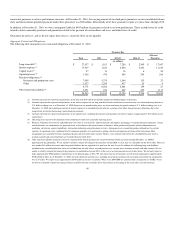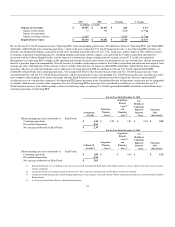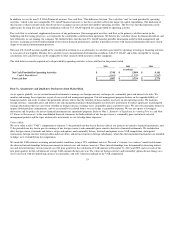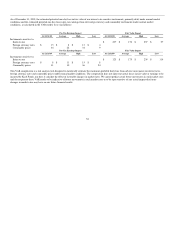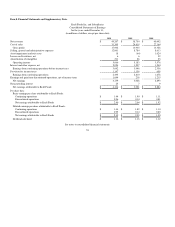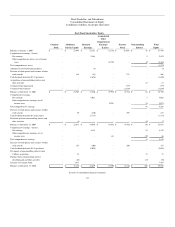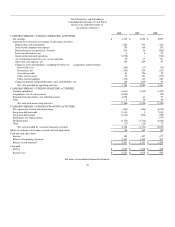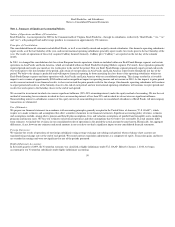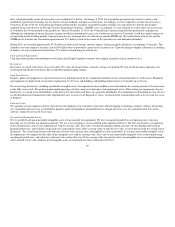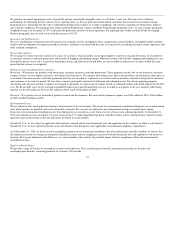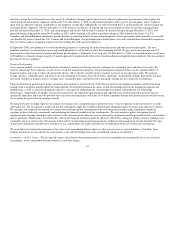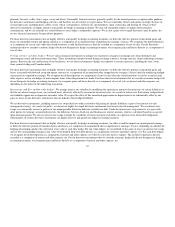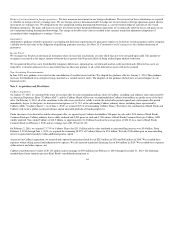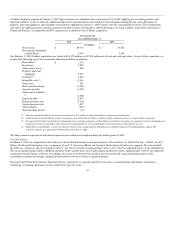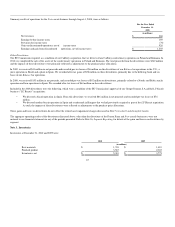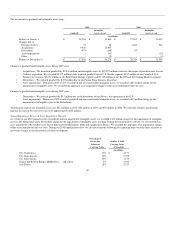Kraft 2010 Annual Report Download - page 62
Download and view the complete annual report
Please find page 62 of the 2010 Kraft annual report below. You can navigate through the pages in the report by either clicking on the pages listed below, or by using the keyword search tool below to find specific information within the annual report.
Kraft Foods Inc. and Subsidiaries
Notes to Consolidated Financial Statements
Note 1. Summary of Significant Accounting Policies:
Nature of Operations and Basis of Presentation:
Kraft Foods Inc. was incorporated in 2000 in the Commonwealth of Virginia. Kraft Foods Inc., through its subsidiaries (collectively "Kraft Foods," "we," "us"
and "our"), sells packaged food and beverage products to consumers in approximately 170 countries.
Principles of Consolidation:
The consolidated financial statements include Kraft Foods, as well as our wholly owned and majority owned subsidiaries. Our domestic operating subsidiaries
report results as of the last Saturday of the year, and our international operating subsidiaries generally report results two weeks prior to the last Saturday of the
year. The results of operations of the newly acquired Cadbury Limited (formerly, Cadbury plc) ("Cadbury") are reported on the last day of the calendar
month.
In 2010, we changed the consolidation date for certain European biscuits operations, which are included within our Kraft Foods Europe segment, and certain
operations in Asia Pacific and Latin America, which are included within our Kraft Foods Developing Markets segment. Previously, these operations primarily
reported period-end results one month or two weeks prior to the end of the period. Now our Kraft Foods Europe segment primarily reports period-end results
two weeks prior to the last Saturday of the period, and certain of our operations in Asia Pacific and Latin America report results through the last day of the
period. We believe the change is preferable and will improve financial reporting by better matching the close dates of the operating subsidiaries within our
Kraft Foods Europe segment and those operations with Asia Pacific and Latin America with our consolidated reporting. This change resulted in a favorable
impact to net revenues of approximately $200 million and an insignificant impact on operating income and net income in 2010. As the impacts to prior period
results were not material to our financial results, we have not revised the prior period results for this change. Our domestic operating subsidiaries will continue
to report period-end results as of the Saturday closest to the end of each period, and our international operating subsidiaries will continue to report period-end
results two weeks prior to the Saturday closest to the end of each period.
We account for investments in which we exercise significant influence (20%-50% ownership interest) under the equity method of accounting. We use the cost
method of accounting for investments in which we have an ownership interest of less than 20% and in which we do not exercise significant influence.
Noncontrolling interest in subsidiaries consists of the equity interest of noncontrolling investors in consolidated subsidiaries of Kraft Foods. All intercompany
transactions are eliminated.
Use of Estimates:
We prepare our financial statements in accordance with accounting principles generally accepted in the United States of America ("U.S. GAAP"), which
require us to make estimates and assumptions that affect a number of amounts in our financial statements. Significant accounting policy elections, estimates
and assumptions include, among others, pension and benefit plan assumptions, lives and valuation assumptions of goodwill and intangible assets, marketing
programs and income taxes. We base our estimates on historical experience and other assumptions that we believe are reasonable. If actual amounts differ
from estimates, we include the revisions in our consolidated results of operations in the period the actual amounts become known. Historically, the aggregate
differences, if any, between our estimates and actual amounts in any year have not had a significant impact on our consolidated financial statements.
Foreign Currencies:
We translate the results of operations of our foreign subsidiaries using average exchange rates during each period, whereas balance sheet accounts are
translated using exchange rates at the end of each period. We record currency translation adjustments as a component of equity. Transaction gains and losses
are recorded in earnings and were not significant for any of the periods presented.
Highly Inflationary Accounting:
In the fourth quarter of 2009, the Venezuelan economy was classified as highly inflationary under U.S. GAAP. Effective January 1, 2010, we began
accounting for our Venezuelan subsidiaries under highly inflationary accounting
59


